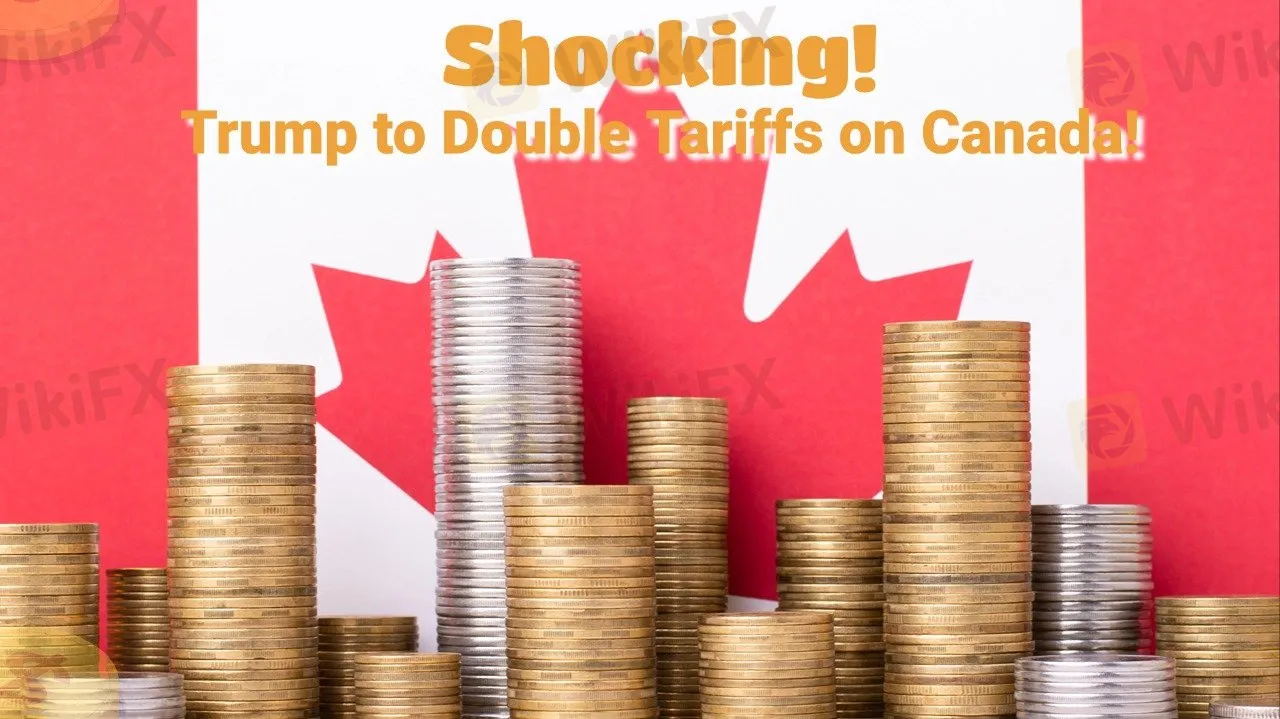简体中文
繁體中文
English
Pусский
日本語
ภาษาไทย
Tiếng Việt
Bahasa Indonesia
Español
हिन्दी
Filippiiniläinen
Français
Deutsch
Português
Türkçe
한국어
العربية
Shocking! Trump to Double Tariffs on Canada!
Abstract:Trump announced a tariff hike on Canadian steel and aluminum to 50%, shaking the markets. The Canadian stock market took a hit, the Canadian dollar plummeted, and U.S. steel and aluminum stocks surged, triggering strong reactions from all sides.

U.S. President Donald Trump recently declared an additional 25% tariff on Canadian steel and aluminum imports, bringing the total tariff rate to 50%.
This decision was made in response to Ontario‘s move to impose a 25% tax on electricity exports to the U.S. Trump stated that the tariff increase was a countermeasure against Canada’s trade policies and warned that if Canada did not withdraw its tariffs, the trade war could escalate further.
The announcement sent shockwaves through global markets. Both U.S. and Canadian stock markets fell, the Canadian dollar plunged, while U.S. steel and aluminum stocks surged. Later, Trump hinted at a possible concession on the tariff issue, briefly easing market concerns.
By 4 p.m. Eastern Time, the White House confirmed that the existing 25% tariffs on steel and aluminum would take effect at midnight, though no details were provided on the enforcement of the 50% tariff.
Canada responded firmly, refusing to yield to Trump‘s pressure and even threatening to cut off electricity supplies to the U.S. Former U.S. Treasury Secretary Larry Summers criticized the policy as “self-inflicted harm,” warning that it could worsen recession risks. Meanwhile, the UK government stated that it would not respond to Trump’s tariff threats but would continue seeking an exemption.
Overall, Trumps decision not only strained U.S.-Canada relations but also created economic and political uncertainty on a global scale.
Disclaimer:
The views in this article only represent the author's personal views, and do not constitute investment advice on this platform. This platform does not guarantee the accuracy, completeness and timeliness of the information in the article, and will not be liable for any loss caused by the use of or reliance on the information in the article.
Read more

Fed Holds Rates Steady! Yen Faces Growing Uncertainty
The Fed stays put but strikes a hawkish tone. The yen remains under pressure as market uncertainty deepens.

Is Your Money Safe with Libra Markets? Check Out Fast!
n this exposure episode, we will take you through the heinous game played by Libra Markets, an unregulated forex broker. Take a look at how people are facing issues regarding withdrawals.

TradeHall vs. HYCM: Which Broker Should You Choose?
When choosing a broker, understanding the difference between superficial features and real regulatory protection is essential. In this article, WikiFX will compare TradeHall and HYCM. While on the surface, both brokers offer a wide range of trading instruments, the real difference lies in their regulatory statuses, which is a commonly overlooked factor for traders when they opt for brokers.

Trade Nation vs. FBS: Which Broker Is Better for New Traders?
If you're new to trading, choosing the right broker can feel overwhelming. Two popular choices, Trade Nation and FBS, offer very different experiences. This comparison breaks down which is better suited for beginners, based on ease of use, safety, costs, and support.
WikiFX Broker
Latest News
Tether Freezes $12.3 Million in USDT Over Money Laundering Concerns
MiCA Unlocks EU Crypto Market, but National Tensions Rise as Gemini and Coinbase Near Approval
Retirement Dreams Shattered: Don't Do This To Yourself!
Philippines Sets Southeast Asia’s First Crypto Regulatory Framework
EU Regulators Imposed Over €71M in Sanctions in 2024, ESMA Calls for Enforcement Convergence
FortuixAgent Review 2025: Is it Scam or Legit?
Danske Bank expects the European Central Bank to make its final interest rate cut in September.
No Regulation, Revoked Licence: Is Tradehall Safe to Use?
FXGT.com Trading Platform Review 2025
ATTENTION! Red Alert on These Brokers !
Currency Calculator


